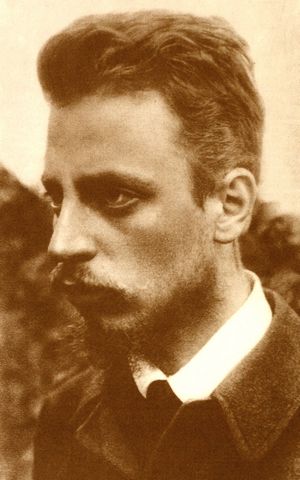Rainer Maria Rilke híres idézetei
Rainer Maria Rilke idézetek
„Rózsa, te tiszta ellentmondás, gyönyörüség,
Annyi temérdek pilla alatt senkisem alszik.”
Nemes Nagy Ágnes
A párduc című verse, Hátrahagyott versek
Nemes Nagy Ágnes
Idézetek verseiből, Új versek
Nemes Nagy Ágnes
Idézetek verseiből, Duinói elégiák
„S csillagként ragyog fel majd felettem
a mosoly, mely rajtad bujdokolt.”
Radnóti Miklós
Idézetek verseiből, Új versek
Rainer Maria Rilke: Idézetek angolul
Translated by Stephen Mitchell
Sonnets to Orpheus (1922)
Letter Six (23 December 1903)
Letters to a Young Poet (1934)
Letter to his wife, reprinted in Rilke’s Letters on Cézanne (1952, trans. 1985). (October 21, 1907)
Rilke's Letters
Wie soll ich meine Seele halten, daß
sie nicht an deine rührt? Wie soll ich sie
hinheben über dich zu andern Dingen?
Ach gerne möchte ich sie bei irgendetwas
Verlorenem im Dunkel unterbringen
an einer fremden stillen Stelle, die
nicht weiterschwingt, wenn diene Tiefen schwingen.
Doch alles, was uns anrührt, dich und mich,
nimmt uns zusammen wie ein Bogenstrich,
die aus zwei Saiten eine Stimme zieht.
Auf welches Instrument sind wir gespannt?
Und welcher Geiger hat uns in der Hand?
O süßes Lied.
Liebes-Lied (Love Song) (as translated by Cliff Crego)
Neue Gedichte (New Poems) (1907)
Letter Seven (14 May 1904)
Letters to a Young Poet (1934)
Letter to his wife, reprinted in Rilke’s Letters on Cézanne (1952, trans. 1985). (October 23, 1907)
Rilke's Letters
Translated by Annemarie S. Kidder
Das Stunden-Buch (The Book of Hours) (1905)
Letter Eight (12 August 1904)
Letters to a Young Poet (1934)
Sein Blick ist vom Vorübergehen der Stäbe
so müd geworden, daß er nichts mehr hält.
Ihm ist, als ob es tausend Stäbe gäbe
und hinter tausend Stäben keine Welt.<p>Der weiche Gang geschmeidig starker Schritte,
der sich im allerkleinsten Kreise dreht,
ist wie ein Tanz von Kraft um eine Mitte,
in der betäubt ein großer Wille steht.<p>Nur manchmal schiebt der Vorhang der Pupille
sich lautlos auf—. Dann geht ein Bild hinein,
geht durch der Glieder angespannte Stille—
und hört im Herzen auf zu sein.
As translated by Albert Ernest Flemming
Der Panther (The Panther) (1907)
Translated by Annemarie S. Kidder
In Celebration of Me (1909)
On young couples who have not yet matured enough to recognize and respect each other's solitude
Letter Seven (14 May 1904)
Letters to a Young Poet (1934)
Letter to his wife, reprinted in Rilke’s Letters on Cézanne (1952, trans. 1985). (October 23, 1907)
Rilke's Letters
About Rome.
Letter Five (29 October 1903)
Letters to a Young Poet (1934)
Letter Three (23 April 1903)
Letters to a Young Poet (1934)
Letter Four (16 July 1903)
Letters to a Young Poet (1934)
Letter Ten (26 December 1908)
Letters to a Young Poet (1934)
Letter to his wife, reprinted in Rilke’s Letters on Cézanne (1952, trans. 1985). (June 24, 1907)
Rilke's Letters
Letter One (17 February 1903)
Letters to a Young Poet (1934)
“They more adeptly bend the willow's branches
who have experience of the willow's roots.”
Sonnet 6 (as translated by Edward Snow)
Sonnets to Orpheus (1922)
Herr: es ist Zeit. Der Sommer war sehr groß.
Leg deinen Schatten auf die Sonnenuhren,
und auf den Fluren laß die Winde los.
Herbsttag (Autumn Day) (as translated by Cliff Crego)
Das Buch der Bilder (The Book of Images) (1902)
“Everywhere I am folded, there I am a lie.”
As quoted in News of the Universe : Poems of Twofold Consciousness (1995) by Robert Bly, p. 125
Letter One (17 February 1903)
Letters to a Young Poet (1934)
Eredeti: (de) Mein Gott, fiel es mir mit Ungestüm ein, so bist du also. Es giebt Beweise für deine Existenz. Ich habe sie alle vergessen und habe keinen je verlangt, denn welche unge heuere Verpflichtung läge in deiner Gewißheit. Und doch, nun wird mirs gezeigt.
Forrás: The Notebooks of Malte Laurids Brigge (1910), p. 135
